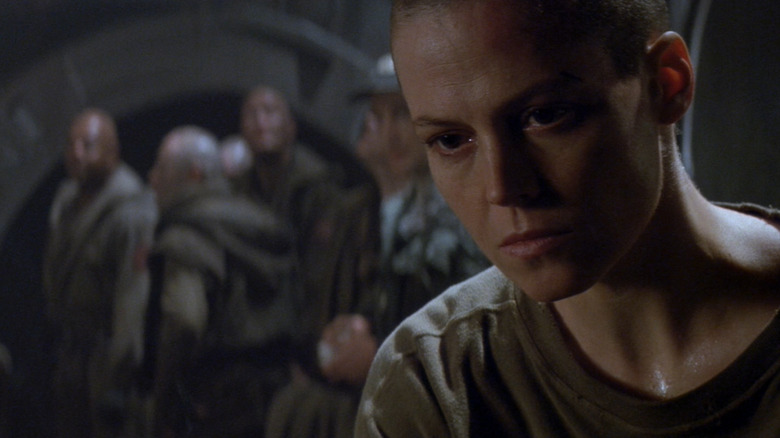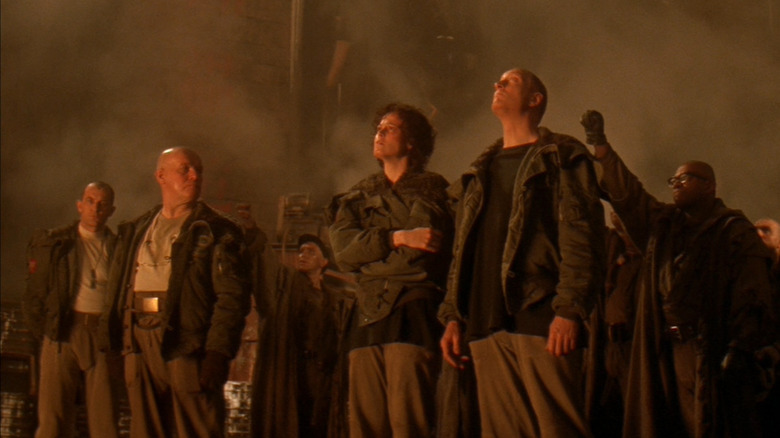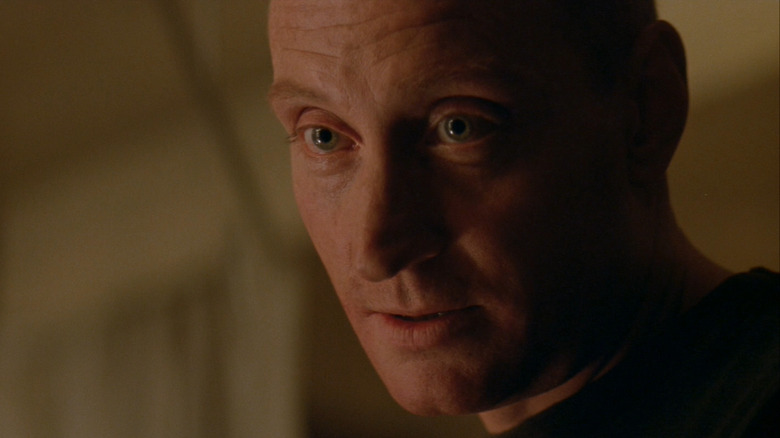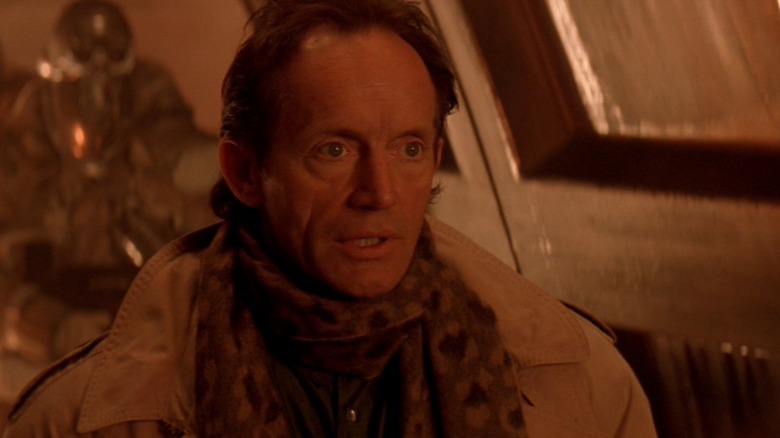David Fincher's Alien 3 Is An Oppressive Interrogation Of Toxic Masculinity
"Alien 3" is bleak even for an "Alien" movie, but it's also a harrowing, brutal examination of toxic masculinity and how the prison system can reinforce this dangerous mentality. The movie starts with franchise hero Ellen Ripley (Sigourney Weaver) and her three fellow survivors from "Aliens" crash-landing on the prison space station Fiorina "Fury" 161, but only Ripley makes it through the crash. She's woken up from stasis and welcomed to her new nightmare situation by the prison's doctor, Clemens (Charles Dance). She went out of the frying pan and into the fire, escaping the murderous xenomorphs only to end up surrounded by a completely different kind of predator: men.
The "Alien" franchise had some pretty allegorical threats of rape and pregnancy through facehuggers and chestbursters, but "Alien 3" directly addresses the horrors of trying to survive when other people feel entitled to your body. It's deeply relevant in our own post-Roe v. Wade world, but it also examines how this kind of intense, rigid masculinity can hurt the very men who continue its pervasive existence. Many people dismiss "Alien 3" as too dark, too existential, and too structurally messy to be a successful "Alien" movie, but it's a surprisingly deep film with a lot on its mind that deserves reassessment.
In 2023, "Alien 3" is unfortunately as relevant as ever, and it's time to dig into why this 1992 sci-fi horror sequel deserves to be appreciated for its willingness to dissect some challenging topics, even when it gets genuinely uncomfortable.
Exploring fear through allegory
One of my favorite things about the first three "Alien" films is that each one is so wildly different from the others. Ridley Scott's "Alien" is a haunted house movie set in outer space, with the deadly xenomorphs replacing ghosts, while James Cameron's "Aliens" is an all-out action extravaganza with a climax that pits Ripley against the alien queen in a knock-down, drag-out brawl for the ages. Following up the bombastic fun of "Aliens" with the dour "Alien 3" was guaranteed to upset people, but when you remove your expectations of it as a sequel to "Aliens," it's actually a great science fiction film.
Science fiction exists as a way for people to explore their fears through allegories, starting with Mary Shelley's "Frankenstein" in 1818, and "Alien 3" uses the all-male prison colony of Fury to examine fears of losing bodily autonomy, sexual assault, and the reinforcement of violent behavior in men. Even the xenomorph that eventually ends up on the loose is less of a danger to Ripley than the men, and for complicated reasons.
You see, Ripley is "pregnant" with an alien queen, which will eventually burst out of her chest and in turn spawn a whole bunch of her own little facehuggers. A xenomorph that grows inside either a Rottweiler or a cow (depending on which version of the film you watch) ends up on the loose and starts hunting down and killing the male prisoners, but it leaves Ripley alone because it can smell the xenomorph queen within her. After everything she's been through in the first two movies, she still ends up in the worst imaginable situation, and that's pretty brutal, but it's also an all-too-accurate allegory for many people's real lives.
The nuances of desire
There are extra layers of isolation at play in "Alien 3," as Ripley finds herself almost completely alone on Fury. She's recovering from stasis sickness, she's unknowingly playing host to a xenomorph, and then she is nearly raped by a group of prisoners when she goes looking for the android Bishop's (Lance Henriksen) body. The men of Fury are described as having the genetic capability for violence, possibly with an XYY chromosomal abnormality. Scientists have argued for decades whether having an extra Y chromosome truly causes people to be more violent, but the men of Fury are all convicted violent offenders and some seem proud of it.
The group's spiritual leader, Dillon (Charles S. Dutton), is a convicted rapist and murderer, but he's led the men to all take a vow of celibacy, and he is the one that stops Ripley's assault despite clearly hating her presence on Fury. For Dillon and the men who follow him, their sexuality is a binary where they can either be violent rapists or they must be completely celibate. That's some pretty regressive, Old Testament thinking, and it makes the men even more dangerous because they blame Ripley for tempting them.
The only person that Ripley can trust to some degree is Clemens, a former physician, who treats her with empathy and compassion from the start. Unlike many of his prison mates, his crime was truly accidental. While high on morphine after a long shift, the doctor prescribed the wrong amount of painkiller and killed 11 men. In the Assembly Cut of the film, which hews closer to director David Fincher's original vision, Clemens and Ripley have sex, a scene that humanizes them both and helps give more nuance to the battle of the sexes happening between Ripley and the prisoners.
It's ultimately about control
In order to survive in "Alien 3," Ripley must embrace the very masculinity that surrounds and oppresses her. She shaves her head, wears men's clothes, and hides any possible perceived weakness, like her cryo-sickness. It's a fantastic representation of what it can be like to exist as a marginalized person surrounded by those with more power, and it's especially accurate to the female experience. Eventually, the prisoners and Ripley are to be rescued by Weyland-Yutani suits who come to take care of things. But even then, Ripley has her bodily autonomy taken from her, as another Bishop android has orders to preserve the alien queen inside of Ripley for study, so they could create a bio-weapon. In the end, Ripley chooses to plummet to a fiery death in the furnace of the foundry, clutching her infant chestburster to her breast. While it's a pretty on-the-nose image, it's also a heartbreaking representation of what can happen when a person is kept from having control over their own body.
Ripley's death at the end of "Alien 3" is tragic but befitting for the character, who has endured so much and finally finds an escape that offers her some kind of peace. Whether she's been running from the allegorical assault of the aliens, the misogyny and lust of the men of Fury, or the capitalist corporate control of Weyland-Yutani, Ripley has faced the harmful effects of a patriarchal society time and time again. She went from final girl to Newt's surrogate mother to a battle-weary crone over the course of the three films.
The brilliance of "Alien 3" is its willingness to accept the brutal truth that, in a patriarchal world, there is no happy ending for a woman like Ellen Ripley.



